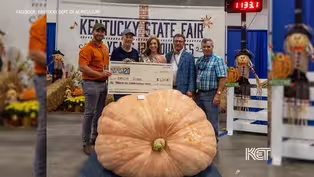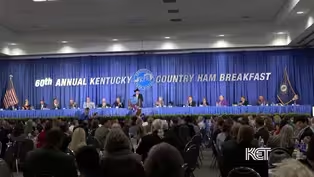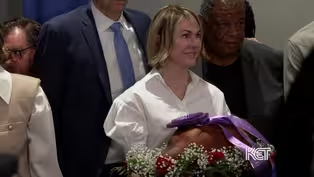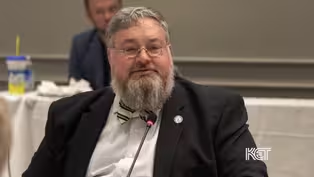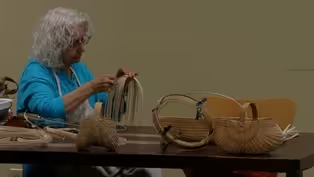
Debunking Head Lice Myths
Clip: Season 3 Episode 59 | 3m 32sVideo has Closed Captions
Preventing and treating head lice.
A pediatrician with Norton Children’s debunks a few common myths about head lice.
Problems playing video? | Closed Captioning Feedback
Problems playing video? | Closed Captioning Feedback
Kentucky Edition is a local public television program presented by KET

Debunking Head Lice Myths
Clip: Season 3 Episode 59 | 3m 32sVideo has Closed Captions
A pediatrician with Norton Children’s debunks a few common myths about head lice.
Problems playing video? | Closed Captioning Feedback
How to Watch Kentucky Edition
Kentucky Edition is available to stream on pbs.org and the free PBS App, available on iPhone, Apple TV, Android TV, Android smartphones, Amazon Fire TV, Amazon Fire Tablet, Roku, Samsung Smart TV, and Vizio.
Providing Support for PBS.org
Learn Moreabout PBS online sponsorshipThere's lots on a kid's mind when they go back to school.
But what happens if one of them is lice?
We spoke to a pediatrician from Norton Children's Hospital about what the CDC guidance says about sending kids home from school and to debunk common myths about the pesky parasite.
More of that in tonight's medical news headlines.
Or that little louse is a parasitic bug that infest near the hair follicles.
So they really only live within a centimeter or two of the scalp.
And most commonly occurs in the preschool to grade school age.
So kind of 3 to 12 year old age group.
There's a lot of myths about head, so people are typically concerned that it's going to jump to them and that head lice do not jump.
They can get spread by direct contact.
So really to get lice from another person we're talking about like our head touching.
There is some risk, although not that high risk, but there is some risk of transmission by like sharing things that other people's hands have touch.
So thinking like had hair brushes comes, a lot of schools will have like what's called a no net policy that essentially if someone sees something that looks like a net, which is like a little white encasing, that's like attached to a single hair that the kid has to be excluded from school until those are gone.
That's been the recommendation from the American Academy of Pediatrics that no, no policies should not be in effect at schools.
Typically, the concern is when kids are getting singled out and embarrassed by being sent home.
And too, there's a lot of misdiagnosis.
So you know that you think that little white flaky thing attached to a hair.
There's a lot of other things that can look like a white flaky thing attached to a hair.
So dandruff or dry scalp can be misdiagnosed.
If you go to the CDC website about lice, there is a box that says our guidance has not changed.
So it's been a long standing policy that children who have lice should not get sent home from school.
Their parents should be alerted that someone sees something that looks like lice.
They should start treatment that day.
And then once they've started treatment, they can return to school.
Head lice is is very common.
You know, a lot of kids are going to get it and trying to minimize, you know, the the shame and embarrassment.
I think another common misconception that we didn't mention earlier is that the kids who get lice are dirty in some way.
And that's just not true.
And so, you know, having lice doesn't mean that that kid is not getting a shower or a bath or that they're otherwise dirty.
It's just a very common problem to see among children.
Video has Closed Captions
Clip: S3 Ep59 | 2m 39s | Jonathan Shell on his first state fair as Kentucky's Agriculture Commissioner. (2m 39s)
Kentucky Farm Bureau’s Country Ham Breakfast Turns 60
Video has Closed Captions
Clip: S3 Ep59 | 3m 51s | Annual Country Ham Breakfast at the Kentucky State Fair turned 60 this year. (3m 51s)
Video has Closed Captions
Clip: S3 Ep59 | 3m 45s | Record $10.5 million bid at Kentucky Farm Bureau Country Ham Breakfast. (3m 45s)
Video has Closed Captions
Clip: S3 Ep59 | 3m 58s | System designed to reduce wrong-way crashes will soon be put to the test in Kentucky. (3m 58s)
Talking About School Choice at School
Video has Closed Captions
Clip: S3 Ep59 | 1m 59s | AG on whether schools can weigh in on proposed school choice amendment. (1m 59s)
Video has Closed Captions
Clip: S3 Ep59 | 1m 39s | Kentucky Museum at Western Kentucky University hosted the White Oak Gathering. (1m 39s)
Providing Support for PBS.org
Learn Moreabout PBS online sponsorship
- News and Public Affairs

Top journalists deliver compelling original analysis of the hour's headlines.

- News and Public Affairs

FRONTLINE is investigative journalism that questions, explains and changes our world.












Support for PBS provided by:
Kentucky Edition is a local public television program presented by KET
